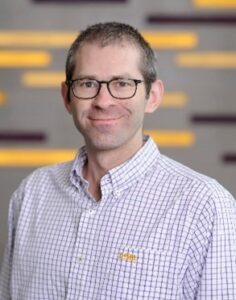LCSR Seminar: Hunter Gilbert “Continuum Robots: Addressing Challenges through Modeling, Design, and Control”
 Continuum robots change their shape with elastic deformations rather than mechanical joints and are often elastically deform under typical forces for their applications. They have advantages in some environments where geometry may be complex and not well-known in advance of operations, which is a common feature of many applications outside of factory settings. Continuum robots leverage contact and deformation to complete tasks, relying on passive mechanical behaviors in addition to software-based intelligence and traditional control systems. For example, robots with slender, snake-like, elastic bodies can navigate the tortuous human anatomy like the colon or the esophagus to perform surgery, or they can navigate through challenging industrial environments like pipelines and machinery to perform “minimally invasive” inspection and maintenance. However, slender bodies and mechanical softness come with distinct engineering challenges. Many slender-bodied soft robots have adopted remote actuation approaches that suffer from exponentially worsening friction as they bend. Additionally, many approaches to actuation result in an undesirable coupling between actuators. In this seminar, I will describe our recent research that has focused on improving the understanding of continuum mechanism manipulator designs, models, and applications. Ongoing studies are aimed at (i) improving the design of electromechanically driven continuum robots; (ii) investigating methods to mitigate friction in long, slender devices; and (iii) improving modeling approaches for continuum robots.
Continuum robots change their shape with elastic deformations rather than mechanical joints and are often elastically deform under typical forces for their applications. They have advantages in some environments where geometry may be complex and not well-known in advance of operations, which is a common feature of many applications outside of factory settings. Continuum robots leverage contact and deformation to complete tasks, relying on passive mechanical behaviors in addition to software-based intelligence and traditional control systems. For example, robots with slender, snake-like, elastic bodies can navigate the tortuous human anatomy like the colon or the esophagus to perform surgery, or they can navigate through challenging industrial environments like pipelines and machinery to perform “minimally invasive” inspection and maintenance. However, slender bodies and mechanical softness come with distinct engineering challenges. Many slender-bodied soft robots have adopted remote actuation approaches that suffer from exponentially worsening friction as they bend. Additionally, many approaches to actuation result in an undesirable coupling between actuators. In this seminar, I will describe our recent research that has focused on improving the understanding of continuum mechanism manipulator designs, models, and applications. Ongoing studies are aimed at (i) improving the design of electromechanically driven continuum robots; (ii) investigating methods to mitigate friction in long, slender devices; and (iii) improving modeling approaches for continuum robots.
Bio:
Hunter B. Gilbert received the B.S. degree in mechanical engineering in 2010 from Rice University (Houston, Texas), and the Ph.D. degree in mechanical engineering in 2016 from Vanderbilt University (Nashville, Tennessee). He conducted a postdoctoral fellowship in the Physical Intelligence Department of the Max Planck Institute for Intelligent Systems (Stuttgart, Germany), supported by an Alexander von Humboldt Stiftung postdoctoral fellowship from 2016-2019. He is currently an Associate Professor of Mechanical Engineering at Louisiana State University, where he is co-director of the Innovation in Control and Robotics Engineering (iCORE) research laboratory. He is an Associate Editor for the IEEE Robotics and Automation Letters and for Frontiers in Robotics and AI. His research interests are centered on several themes within applied mechanics and dynamic systems: mechanically “soft” or deformable robots, systems and technologies focused on human health and safety, and modeling of complex dynamic systems.


